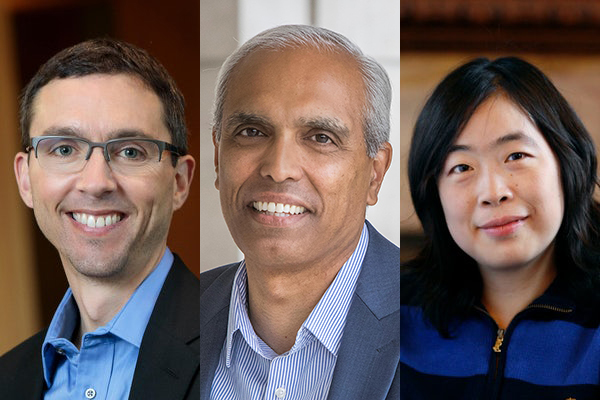Three McKelvey Engineering faculty named among ‘highly cited researchers’ worldwide
Randall Martin, Rohit Pappu and Lan Yang are recognized for their work by the Institute for Scientific Information

Randall Martin, Rohit Pappu and Lan Yang, all professors in the McKelvey School of Engineering at Washington University in St. Louis, have been named among the most highly-cited researchers in the sciences by the Institute for Scientific Information in 2020.
Martin, professor of energy, environmental & chemical engineering; Pappu, the Edwin H. Murty Professor of Engineering in the Department of Biomedical Engineering; and Yang, the Edwin H. & Florence G. Skinner Professor in the Department of Electrical & Systems Engineering, were among 54 faculty with primary affiliations at Washington University named to the list, which recognizes researchers worldwide who have demonstrated significant and broad influence reflected in their publication of multiple papers that have been highly cited by their peers over the course of the last decade. These papers rank in the top 1% by citations for these fields and year in Web of Science.
Washington University ranks 10th in the world for its number of highly-cited researchers. For 2020, about 6,100 researchers made the overall list.
Martin's research focuses on characterizing atmospheric composition to inform effective policies surrounding major environmental and public health challenges ranging from air quality to climate change. He leads a research group at the interface of satellite remote sensing and global modeling, with applications that include population exposure for health studies, top-down constraints on emissions, and analysis of processes that affect atmospheric composition. He serves as co-model scientist for a leading global atmospheric model (GEOS-Chem), leads a global fine particulate matter network (SPARTAN) to evaluate and enhance satellite-based estimates of fine particulate matter, and on multiple science teams for satellite instruments including MAIA, TEMPO and GEMS. Data from his group are relied upon for a large number of assessments, including for the OECD Regional Well-Being Index, for World Health Organization estimates of global mortality due to fine particulate matter, for the Global Burden of Disease Project to examine the risk factors affecting global public health and for a wide range of health studies.
Pappu's research focuses on intrinsically disordered proteins (IDPs), specifically their roles in transcriptional regulation, receptor mediated cell signaling and cellular stress response. The Pappu lab has pioneered the combined use of polymer physics theories, novel homegrown computational methods, and experiments to probe the functional and phenotypic impacts of IDPs. Pappu's lab also has a large focus on neurodegeneration in Huntington's and Alzheimer's diseases. The central goal is to understand how protein aggregation and protein homeostasis pathways collude to give rise to neuronal death as a function of aging.
Yang is a fellow of IEEE, the American Physical Society and of The Optical Society. Her research interests include fabrication, characterization and fundamental understanding of advanced nano/micro photonic devices with outstanding optical properties or novel features for unconventional control of light flow. Her group focuses on the silicon-chip-based, ultra-high-quality micro-resonators and their applications for sensing, lasing, nonlinear optics, environmental monitoring, biomedical research and communication. Her Laboratory of Micro/Nano Photonics Research Group has demonstrated the first on-chip micro-resonator-based particle sensors that can achieve not only detection but also size measurement of single nanoparticles one by one. Different materials with tailored chemical compositions and nanostructures are used in her research to achieve advanced micro/nano photonic devices with desired properties, such as nonreciprocal light transmissions in a parity-time-symmetric optical resonator system, an all-optical analog of an electronic diode that allows current flow in one direction.
Click on the topics below for more stories in those areas
- Brief
- Research
- Energy, Environmental & Chemical Engineering
- Electrical & Systems Engineering
- Biomedical Engineering






